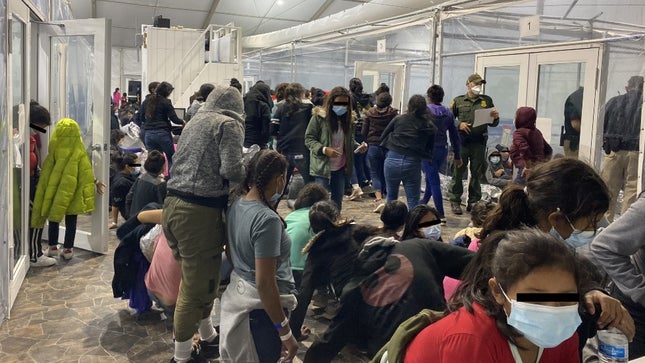by Michael Rectenwald

To date, no major political party in the United States has issued a coherent, principled policy on immigration. Without a principled policy, political jockeying has been the rule of the day.
The Libertarian Party advocates a veritable open border policy on the grounds of laissez-faire. The LP likens the movement of people across borders to the movement of capital and goods: “To promote economic freedom, they demand the unrestricted movement of humans as well as financial capital across national borders.” While this may strike some libertarians as self-consistent, the platform prong is nevertheless ill conceived. As demonstrated by Lew Rockwell—following the analyses of Hans-Hermann Hoppe and Murray Rothbard—for several reasons, immigration cannot be equated with international trade. In short, despite the murkiness of the concept of “public property,” unvetted immigration infringes the property rights of citizens.
President Donald Trump’s immigration policy was instituted as part of the “America First” platform. Although it may be understood in terms of the property rights of US citizens, it was never justified on these grounds. The result was that Democrats and the media could claim that the policy was racist rather than principled.
Now that the Left has secured complete control of the federal government, the lack of principle is resulting in a humanitarian crisis under the banner of humanitarianism, mostly for political gain.
Immediately upon taking office, Biden signed a welter of executive orders and presidential proclamations, issued on “humanitarian” grounds. Full of bromides about human dignity and fairness, the humanitarianism of Biden’s declarations is belied by the infringement of the prerogatives and property rights of US citizens, as well as the apparent endangerment of their health and general welfare. Although the covid crisis is grossly overstated, the hypocrisy of the Left is on full display as mask-less immigrants pour into the country without covid precautions while many Americans remain masked and partially locked down.
This policy, if it can be called a policy, is utterly unprincipled—unless the unstated principle is to systematically reduce the wealth and threaten the welfare of the majority of US citizens, or to provide cheap labor while laying most of the burden for immigrant support on taxpayers, or to swell the voting base of the Democratic Party, or all of the above. Other than Democratic politicians, few citizens gain anything from such unvetted immigration. Most stand to lose. (Perhaps those whose windows are adorned with signs bearing slogans like All Welcome, Love Is Love, and No Human Is Illegal will volunteer to provide immigrants free room and board.)
Biden’s plan is shaping up into a total disaster. One hundred thousand migrants crossed the southern border in February alone. Some migrant facilities reached over 700 percent of capacity, leading the administration to announce that it will house migrants in hotels for extended stays of six months or longer, at taxpayer expense. Meanwhile, the administration will not or cannot answer questions about the humanitarian impact of the immigrant surfeit—for example, how the administration’s treatment of detained children differs from their treatment under Trump, or, for that matter, under the Obama-Biden administration—other than by being worse.
But the politics of welcoming this wave of new immigrants is more significant than even its cultural, social, and economic impact. If the Senate filibuster is repealed, the voting “reform” legislation passed by the House of Representatives (HR 1) would gain a simple majority in the Senate. The Democrats’ voting “reform” legislation would allow virtually anyone to vote by mail—without signature or any other kind of verification—before, during, and after official election days. Democrats could then count on these and other new immigrants to repay their largesse with votes. Biden’s immigration gambit could usher in single-party (Democratic) rule in the United States, for the foreseeable future.
Even if this political legerdemain succeeds, opposition should begin by focusing on a principled response.
The first step is to define “public property” as citizen owned. But in addition to the question of access to “public property” is the more vexing one about just what “public property” is at stake. Immigration affects different regions differently. The majority of illegal immigration filters into six states: California, Texas, Florida, New York, New Jersey, and Illinois. While over 2 million unauthorized immigrants live in California, for now at least, eight states are “home” to fewer than five thousand unauthorized immigrants.
As such, a uniform national immigration policy makes little sense. (Nor, for that matter, does a lot of national policy, especially given the growing disparity between states on many supposedly national issues.) At the very least, cities, counties, and states should be able to make their own immigration policies, guided by the cultural, economic, and political impact of newly arriving immigrants on local inhabitants.
The proverbial can has been kicked down the road for so long that Democrats have seized upon the confusion and used it for sheer political purposes, at the expense of the majority. A clear, regionalized set of policies based on the principle of property rights is long overdue.
First published in Mises Institute.
- Like
- Digg
- Del
- Tumblr
- VKontakte
- Buffer
- Love This
- Odnoklassniki
- Meneame
- Blogger
- Amazon
- Yahoo Mail
- Gmail
- AOL
- Newsvine
- HackerNews
- Evernote
- MySpace
- Mail.ru
- Viadeo
- Line
- Comments
- Yummly
- SMS
- Viber
- Telegram
- Subscribe
- Skype
- Facebook Messenger
- Kakao
- LiveJournal
- Yammer
- Edgar
- Fintel
- Mix
- Instapaper
- Copy Link






